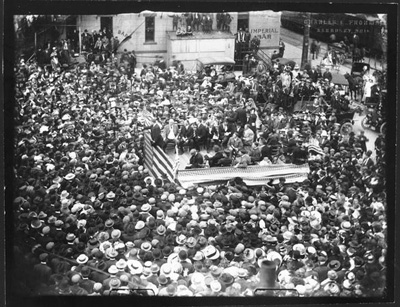|
Moderated by NW Okie! |
Volume 14 , Issue 252012Weekly eZine: (371 subscribers)Subscribe | Unsubscribe Using Desktop... |
The Progessive (Bull Moose) Party of 1912

The Progressive Party (Bull Moose party) of 1912 was an American political party formed by former President Theodore Roosevelt after he split from the Republican party during the national convention and failed to get the nomination for president.
President Teddy Roosevelt boasted, "I'm fit as a bull moose," after being shot in an assassination attempt prior to his 1912 campaign speech in Milwaukee, Wisconsin. Hence the name "Bull Moose Party."
Inspiration for the party's beginnings may have come from Roosevelt's friend and supporter, U. S. Senator Thomas Kearns of Utah, who in October 1906 broke off from the Republican Party and started the American party in that state. Kearns was a Roman Catholic, and this was a direct response to the influence of the leadership of the Church of Jesus Christ of Latter-day Saints on the Senatorial elections between 1902 to 1905.
Bull Moose Convention & Platform
Despite obstacles, the August, 1912 convention opened with great enthusiasm. Over 2,000 delegates attended, including many women. In 1912, neither the other Republican candidate, President Taft, or the Democrat Woodrow Wilson, endorsed women's suffrage on the national level.
The famed suffragette and social worker Jane Addams gave a seconding speech for Roosevelt's nomination. Roosevelt insisted on excluding black Republicans from the South, whom he regarded a corrupt and ineffective element, but included black delegates from all other areas. Roosevelt went so far as to further alienate southern white supporters on the eve of the election, by publicly dining with blacks at a Rhode Island hotel. Roosevelt was nominated by acclamation, with Johnson as his running mate.
Bull Moose Platform
- A National Health Service to include all existing government medical agencies.
- Social insurance, to provide for the elderly, the unemployed, and the disabled
- Limited injunctions in strikes
- A minimum wage law for women
- An eight hour workday
- A federal securities commission
- Farm relief
- Workers' compensation for work-related injuries
- An inheritance tax
- A Constitutional amendment to allow a Federal income tax
- Women's suffrage
- Direct election of Senators
- Primary elections for state and federal nominations
| © . Linda Mcgill Wagner - began © 1999 Contact Me | |
